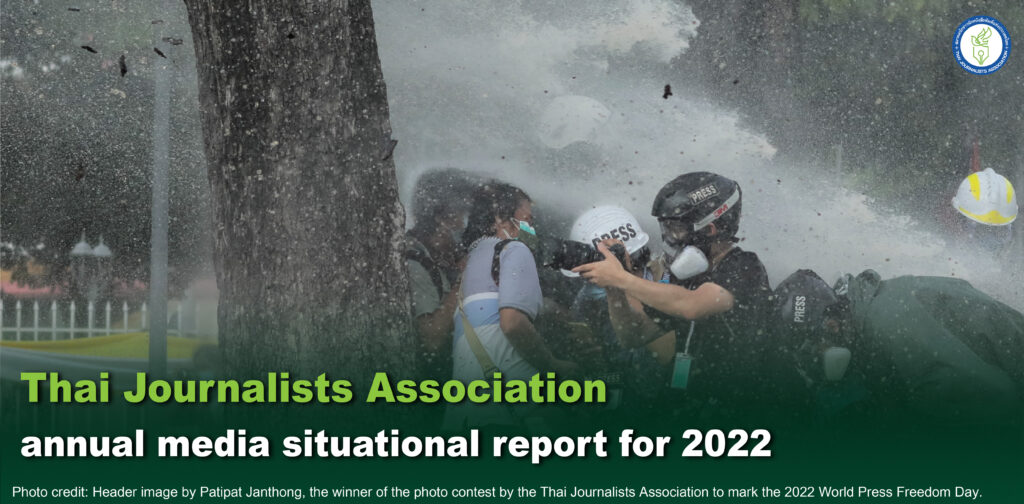2022 saw many significant changes for Thailand and its media industry, from the lifting of an emergency decree and the easing of restrictions related to the COVID-19 pandemic to ever-evolving conversations concerning media freedom, ethics, self-regulation and the safety of media professionals.
The culture of self-censorship lives on
In the overall picture, there have been some improvements to Thai press freedom, as shown in the 2022 index of media freedom published by France-based Reporters Without Borders, which placed Thailand at 115 globally – up from 137 in 2021.
But various factors continue to discourage straightforward journalistic coverage of topics of great public interest. These include the influence wielded by large corporations – many of which are the main sources of revenues for the domestic media – and legal provisions related to freedom of expression, such as a suite of libel laws that criminalize alleged offenders including the royal defamation law (lese-majeste), and the Computer Crimes Act.
Although these laws are not always applied to the media, they nevertheless contribute to a culture of self-censorship in many situations, prolonging a longstanding norm that many media organizations feel compelled to comply with.
Media ethics under scrutiny
Media ethics have given rise to much passionate debate throughout the year, especially in cases of flagrant misconduct. Those included a sting operation mounted by reporters on an elderly monk, Luang Pu Saeng, the hyper-sensational coverage following TV actress Nida “Tangmo” Patcharaveerapong’s death, and the disproportionate airtime given to superstitious news agendas.
These cases and other routine flouting of media ethics by many news organizations prompted some to ask if professional media associations can be relied upon to fulfill their self-appointed watchdog roles.
Ethical shortcoming in the media and failure to self-regulate were used by drafters to justify the so-called media ethics bill in early 2022. The proposed legislation sparked controversy in media circles, pitting those who argued that it would strengthen self-regulation mechanisms against those who see it as just another way for the authorities to interfere with the press.
The debate reflects a lack of consensus – even among media professionals – on how to fix the chronic problem of unprofessional journalism in Thailand.
Massacre as a wake-up call
The mass killing at a daycare center in Nong Bua Lam Phu province left 36 people dead. It was a national tragedy, and also a wake-up call for journalists to review how they go about their reporting with sensitivity and due consideration for those directly affected – basically, how to keep the public informed without adding to the grief.
In the aftermath of the tragedy, experts and media watchdogs have offered a range of advice for the press to follow, including discouraging copycat behavior through news reports, finding a balance between respecting privacy and giving voices to the survivors, and trying to identify long-term solutions for the country as a whole.
Information warfare
The invasion of Ukraine by Russia in February led to a deluge of fake news finding its way into Thai media, and considerable misinformation was disseminated. The majority of these incidents resulted from passing on ‘reports’ from untrustworthy sources and propaganda outlets without applying reasonable scepticism or making adequate verification attempts.
The war in Ukraine is not isolated. Information from dubious sources continues to plague Thailand’s domestic news, and is indeed a growing problem that needs tackling.
Journalists lose out to news personalities
News talk shows dealing almost exclusively with social media dramas and sensational stories of the day enjoyed immense success throughout 2022. But their popularity raises questions about the actual news value of these programmes for audiences. Is this not entertainment masquerading very loosely as journalism?
News channels pouring money into talk shows with personalities has raised concerns that the reckless pursuit of ratings and ad revenues will deter serious journalism in cash-strapped companies. Will Thai media ever be able to afford quality journalism and investigative reporting?
The rise of citizen journalists
As the legacy media battle various crises, a number of ordinary people have stepped up to see if they can do better. So-called citizen journalists and small-sized media operations have proliferated online – particularly younger outfits focusing on regional issues and topics neglected by the mainstream media.
On one hand, this phenomenon raises questions about whether these individuals are versed in ethics, privacy, impartiality and the separation of fact from personal opinion. On the other, citizen journalists and online media entrepreneurs provide choice to consumers and that competition might encourage mainstream media to do better.
Safety in the field
The injuries suffered by many field reporters during political protests in 2021 were taken seriously by the Thai Journalists Association and its partner organizations, who held discussions with the Royal Thai Police several times to work out a “safe space” in which journalists covering street demonstrators can work freely and in relative safety.
However, the final months of 2022 saw a surge of violence against members of the press from some police officers. Despite calls for clarity made by professional media associations, the police have yet to offer any explanation for those violations, or say how they intend to prevent similar incidents in the future.

